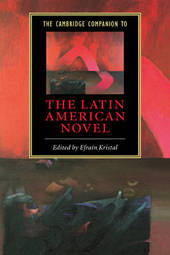
|
The Cambridge Companion to the Latin American Novel
Hardback
Main Details
| Title |
The Cambridge Companion to the Latin American Novel
|
| Authors and Contributors |
Edited by Efrain Kristal
|
| Series | Cambridge Companions to Literature |
|---|
| Physical Properties |
| Format:Hardback | | Pages:360 | | Dimensions(mm): Height 229,Width 152 |
|
| Category/Genre | Literary studies - fiction, novelists and prose writers |
|---|
| ISBN/Barcode |
9780521825337
|
| Classifications | Dewey:863.00998 |
|---|
| Audience | | Tertiary Education (US: College) | | Professional & Vocational | |
|---|
|
Publishing Details |
| Publisher |
Cambridge University Press
|
| Imprint |
Cambridge University Press
|
| Publication Date |
26 May 2005 |
| Publication Country |
United Kingdom
|
Description
The diverse countries of Latin America have produced a lively and ever evolving tradition of novels, many of which are read in translation all over the world. This Companion offers a broad overview of the novel's history and analyses in depth several representative works by, for example, Gabriel Garcia Marquez, Machado de Assis, Isabel Allende and Mario Vargas Llosa. The essays collected here offer several entryways into the understanding and appreciation of the Latin American novel in Spanish-speaking America and Brazil. The volume conveys a real sense of the heterogeneity of Latin American literature, highlighting regions whose cultural and geopolitical particularities are often overlooked. Indispensable to students of Latin American or Hispanic studies and those interested in comparative literature and the development of the novel as genre, the Companion features a comprehensive bibliography and chronology and concludes with an essay about the success of Latin American novels in translation.
Author Biography
Efrain Kristal is Professor of Spanish and Comparative Literature at the University of California, Los Angeles.
Reviews'No corner of the continent remains untouched in the Cambridge Companion. ... This much-needed book ... illuminates the literary contribution to the Spanish-speaking nations of the western hemisphere and Portuguese-speaking Brazil, while offering a broad overview of the novel's history and a sense of its heterogeneity.' The Times Literary Supplement
|